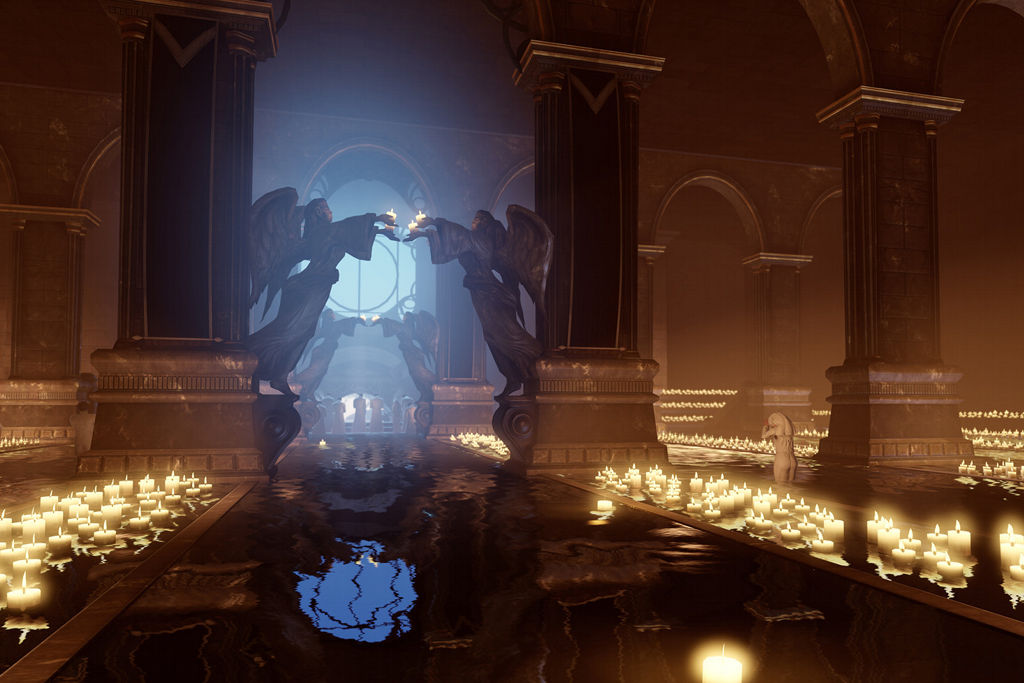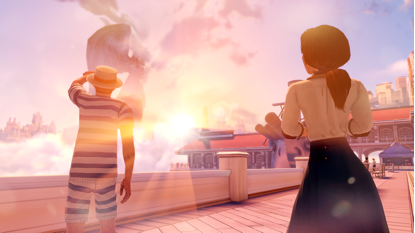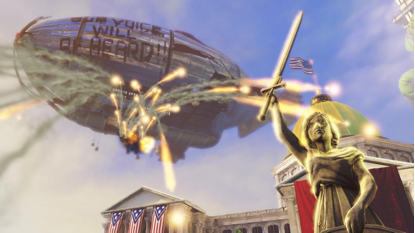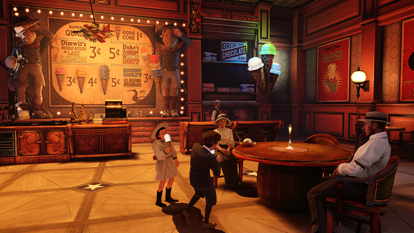Step Into The Uncanny: The Alternate Dimensions of Bioshock Infinite
Is Bioshock Infinite art? And other irrelevant questions. (Heads-up: minor spoilers contained herein.)

Heads-up: a minorly spoilery discussion of Bioshock and Bioshock Infinite follows. They are clearly marked – but read on at your peril if you don’t want anything ruined.
–
I’m Sorry, But Your Princess Is In Another Castle. An Arty Castle.
“Are video games art?” thunders this continually flogged horse of a question across the Internet every time a new game is released. For the love of Mike, isn’t there a better question to be asking about a form? Yes, sometimes they are art. And also, no, sometimes they aren’t!
This exceptionally narrow question not only overlooks the fact that almost all culture exists in both high and lowbrow forms – and that those labels are arbitrarily attached to them by critics who’d like to retain their legitimacy in a culture that increasingly doesn’t need them – but its asking also results in the same kinds of self-aware narrative tricks appearing over and over in games, in an effort to elevate them to the lofty height of critically-agreed upon “art”. Far from encouraging innovation, this is actually encouraging the stagnant repetition of once-great ideas in an endless echo chamber of diminishing returns. Imitation isn’t flattery; it’s lazy and it’s boring as hell.
It seems a strange requisite of artistic worth for video games to aspire to be more like films, or somehow more “literary” in narrative, or otherwise more instantly recognisable as “art”, rather than being what they really should be, which is more like themselves. Video games inhabit the same theoretically limitless universe as animated narratives, but there’s a very important difference: the agency of the player to affect a story’s outcome. The player is not a viewer or reader in the traditional sense as their engagement with the text is active rather than passive, based on the assumption that any engagement with a text can be in any way passive to begin with. Despite this, the critical discourse around big title games remains largely transfixed by unhelpful comparisons. No one is arguing that pop music should be more like television, or films should be more like magazines, or forks should be more like knives; but anyone who has been bludgeoned by the logic-free action sequences of Christopher Nolan’s ponderous Batman films might agree that some Hollywood studios do think that films should be more like set pieces from certain first-person shooter video games.

In addition to the still widely held view that video games are by their nature unserious, these critical anxieties also stem from an inability to easily categorise the new, despite video games as a form predating the birth of rock and roll (a patent was filed in 1947 for an analogue missile-simulation crudely played on the wonderfully named Cathode Ray Tube Amusement Device). Generally speaking, the younger the form, the greater its struggle for critical legitimacy. For games, this is perhaps compounded by an issue of nomenclature: something with “game” in its title will struggle to be taken seriously, and “video” keeps it tethered to an analogue past. Television was only recently accepted into the critical canon once it was deemed to be argued as sufficiently “novelised”. Recap culture now worships at the altar of this new “narrative” or “cinematic” television. I think this speaks more of a strange preoccupation with definitions of what is and isn’t considered intellectually worthy of investigation, based upon privileging certain disciplines and their practitioners (and their critics) as “real artists”, and everyone else as a dilettante, than it does of our habit of comparing new things to old things.
This “games are/aren’t art” argument is just the latest iteration of “Get off my lawn!”, and accusations of the death of culture have previously been laid at the feet of no less than the now sacred cow of highbrow, the novel. Perhaps it still comes down to capitalist anxieties about idle time, because nothing sucks away days of your life’s potential productivity like a new and exceptionally involving video game.
In any case, the current preoccupation with creating a somehow “cinematic” and so worthy or serious gaming experience in big studio titles (Heavy Rain, LA Noire, Spec Ops: The Line, each overwrought and painfully self-aware in their own way) has culminated in producers attempting to render a kind of increasingly Baudrillardian hyper-reality where grains of sand look exactly real and oceans are rendered just as they are on Earth and facial characteristics are modeled on real-life actors – despite the latter continuing to fall straight into the uncanny valley, no matter how advanced motion graphics become. For games to hold up a poor simulacrum of the real as the height of their considerable creative powers displays an abject failure of imagination, thankfully into the breach of which steps Bioshock Infinite.

Would You Kindly Now Read This Part, Which Is The Review?
The original Bioshock is responsible more than any other game for the currently dire state of metacommentary in game narratives, as its big reveal [SPOILER WARNING, N00BS SKIP TO NEXT PARAGRAPH!] – that the player has no agency, actually, and that all players in all games are limited by what seem to be choices, but are in reality preordained paths encoded in the very architecture of games themselves – has been imitated endlessly since, as is what happens with genuinely circuit-breaking innovation in a form.
This has resulted in such spectacularly awful, supposedly clever crap as FarCry 3, an insipid game so poorly written and conceived that its writer, Jeffrey Yohalem, had to publicly explain after its release that it was a satire, duh everyone. A satire so precise that is was indistinguishable from what it was satirising? No. Maybe Yohalem should team up with Damon Lindelof and write another Prometheus script that no one will ever be clever enough to “get” except the two geniuses who wrote it. Clearly Bioshock was at once a blessing and a curse.
Bioshock Infinite returns players to a finely-realised world with no interest in drawing visual parallels with the hyper-real. It revels in its ability to create sumptuous, immersive places that could never exist anywhere on Earth; literally we are floating above it in the sky in the Utopic illusion of Columbia. As with Bioshock’s underwater city of Rapture, the design elements of Infinite were created with minute attention paid to the architectural and typographic details of the historical periods upon which they were based (the art deco of Rapture and the turn of the 20th Century America in Columbia). This creates a wonderful uncanny dissonance between what we know is clearly invented, and what we know was once historically real. We feel we are in an alternate universe, something that Bioshock Infinite deals with in an audacious way in what turns out to be a reveal equally as stunning as the one we were presented with in Rapture, and as equally rich in insight into the inescapable nature of games and their inherent limitations – not their limitless possibilities, which remain only an illusion.

Without spoiling the narrative details, where Bioshock Infinite really excels in using the world-building story powers unique to its medium is in dealing with a concept that film has been uneven at best in tackling: time travel, and all the maddening, logic-wrecking paradoxes that go along with it. Where Looper’s frustrating refusal to explore this meaningfully was explained away with the lame cop-out, “We’ll be here all day, drawing diagrams with straws,” Bioshock Infinite dives straight into them, and uses those straws to construct the most visually arresting vistas limned in a way you’ll never see in the real world, while simultaneously wrestling with those paradoxes on a plausibility level akin to Seth Carreth’s Primer. In this way Bioshock Infinite achieves a lasting emotional and intellectual affect on the player that its medium, when properly engaged, is purpose-built to so powerfully inspire.
What exactly games “are”, taxonomically, doesn’t matter. Where they take us in our minds and our imagination is what counts.
–
Elmo Keep is a writer. She last wrote for Junkee about the Free Economy.
–
<Have you played Bioshock Infinite? Please let’s talk about what this all means! SPOILER WARNING, OBVIOUSLY.>